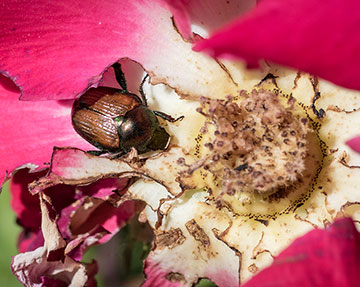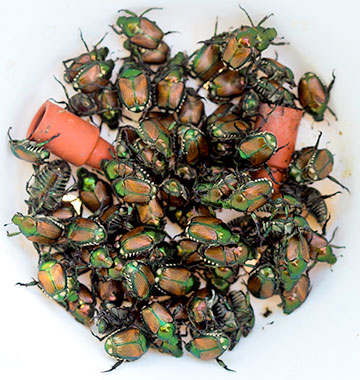 |
Previous Issues |
| Cedar Mill Community Website |
|
Search the Cedar Mill News: |
About The Cedar Mill News |
|
|||||||
| Volume 15, Issue 12 | December 2017 |
||||||
Eradication effort continues after ODA traps catch 23,000 Japanese beetles during the summer!
|
||||||
 |
| A Japanese beetle feeds on rose petals in Cedar Mill, July 2017. |
The Oregon Department of Agriculture (ODA) has completed the first year of its five-year eradication program to eliminate Japanese beetle from Washington County. However, there’s no time to rest, as ODA actively prepares to get the word out and the pieces in place for the 2018 phase of its Japanese beetle eradication program.
The treatment and consent gathering process during 2017 was successful due to the huge amount of support and cooperation of the Cedar Mill community. In March, ODA was joined by three resident volunteers during the door-to-door efforts to gather consent and backing for the project from residents in the area. Bales Marketplace, Tualatin Valley Fire and Rescue Station 68, Leedy Grange, Cedar Mill Community Library, and the Cedar Mill News office all provided meeting space for open houses and informational events. ODA recognizes that there are unique advantages to working in the Cedar Mill area. Last year brought a tremendous amount of community involvement from a core group of residents who actively supported the project, in addition to meeting many smiling faces and gratitude from residents as the program rolled out last summer.
Treatment operations for the first year of the proposed five-year project were completed in June of 2017. In total, 2,212 properties were treated over a span of 6 weeks. At the same time, 2,069 traps to detect adult beetles were placed around the Cedar Mill area by ODA staff. Those traps detected an unprecedented and unexpected 23,000 beetles between June and October of 2017, compared to just over 300 beetles in the same area in 2016. While that may sound like a terrifying situation, there is good news. Roughly 97% of the beetles detected came from traps within the treatment area, including about 30% from a single trap. Because the treatment targets the offspring of the beetles active in 2017, ODA expects to see a decrease in the total populations in 2018.
 |
| Adult Japanese beetles are captured by ODA in bucket traps baited with pheromones in Cedar Mill, July 2017. |
The Oregon Department of Agriculture is rapidly preparing materials and scheduling meetings to communicate plans for 2018. ODA hosted a community partners briefing in October, which provided updates and gathered feedback on plans for 2018. ODA is working to continue to support and create collaborations with local agencies on this project—one of the largest of this nature that ODA has undertaken. Attendees identified ways to improve communication products, new potential partners, and brainstormed solutions to challenges faced in the first year of operations. The meeting had 45 attendees representing nearly 20 groups and agencies including Oregon State Master Gardeners, West Multnomah Soil and Water Conservation, Metro, Oregon Health Authority, Tualatin Riverkeepers, DEQ, HOAs and others.
The number of residences that need to be treated will increase in 2018. Residents in the treatment area will receive a notice in their mailboxes in early January with specific details and instructions on how to provide consent to ODA for treatment. Similarly to last year, consent forms for treatment will need to be signed and returned or completed online to allow ODA to treat the properties and successfully eradicate the Japanese beetle.
A yard debris quarantine has been implemented by ODA in the project area that will continue through 2018. Residential yard debris including grass clippings, plants with soil, and sod must be contained and delivered to a proper location. If you live within the quarantine area, you may continue to use your curbside bin as you normally would. However, if yard debris must be removed from the property, bag and cover the load and take it directly to Northwest Landscape Services, 1800 NW Cornelius Pass Rd, Hillsboro. In order to prevent the spread of Japanese beetle, compost and transfer facilities are not allowed to accept yard debris from the quarantine area. If you use a landscaping service, please inform them of the quarantine, or provide their contact information to ODA to ensure they receive further details.
The seriousness of Japanese beetle establishing in Oregon cannot be overstated. Japanese beetle is more than a nuisance and garden pest. An economic analysis by ODA concluded that farmers would face costs of $43 million annually to combat Japanese beetle. Most of this cost would come from increased pesticide usage. Restrictions on exports to other states and internationally would reduce the marketability of Oregon’s specialty crops, including the $909 million nursery and ornamental plant industry. If the beetle establishes in Oregon, it would be nearly impossible to keep it from spreading and affecting Washington, Idaho, California and other western states.
The opportunity to eradicate Japanese beetle in Oregon is right now, and success depends on the support and cooperation of residents in the area. If you belong to community groups, such as homeowner associations or garden clubs that you think should know about this project, ODA would be pleased to speak at their meetings to provide updates. Please contact ODA’s Insect Pest Prevention and Management program, or contact ODA with suggestions about meetings or events to attend.
ODA is committed to community engagement and will be hosting two open house events in February to answer questions and address concerns about the project. Details about those events will be available soon. Updates and details about plans for 2018 can always be found on the project’s website: www.JapaneseBeetlePDX.info. As always, the Oregon Department of Agriculture invites you to reach out to them with questions, comments and concerns. The Insect Pest Prevention and Management program can be reached at 1-800-525-0137 or you can email japanesebeetle@oda.state.or.us.
Previous article
![]()
Like us on Facebook for timely updates
Published monthly by Pioneer Marketing & Design
Publisher/Editor:Virginia Bruce
info@cedarmillnews.com
PO Box 91061
Portland, Oregon 97291
© 2013